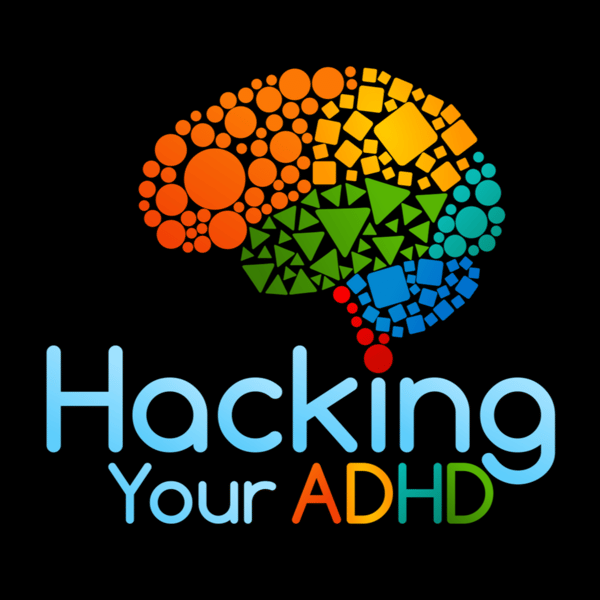An Even Deeper Dive Into Multitasking (rebroadcast)
Hacking Your ADHD
William Curb
4.8 • 702 Ratings
🗓️ 4 April 2022
⏱️ 21 minutes
🧾️ Download transcript
Summary
To recap from last week we learned that are there are three kinds of multitasking - Classic Multitasking where we're trying to perform more than one task at the same time. Rapid task switching where we're just going from one task to another in quick succession. And interrupted task switching where we're interrupted from one task and switch what we're doing without finishing what we were doing.
We also covered how we're more likely to try and multitask with things we're familiar with but how that actually creates more of a cognitive penalty from breaking up our tasks and how we often just don't realize how much concentration we're using to complete a task - as evidenced with how dangerous texting and driving is.
This week we're going to be exploring more of the cognitive and biological costs of multitasking, then get into some specific kinds of multitasking that can really drain us and we'll finish up with some ways we can work on reducing the amount of multitasking we do.
Support me on Patreon
Connect with me on:
Facebook
Twitter
Instagram
or ask me a question on my Contact Page
Find the show note at HackingYourADHD.com/multitaskingpart2
This Episode's Top Tips
- Multitasking has both cognitive and biological costs that accumulate as we do more and more task switching. These costs can be especially hard on those of us with ADHD because they can serve to drain our executive functions.
- Multimedia multitasking is one of the worst ways we can multitask because often we're essentially binge multitasking where we multitask for a sustained period and really drain our systems.
- One of the biggest appeals to multitasking is that we don't have to prioritize what we're doing, we can just choose to do both. To help stave off multitasking work on knowing what your priorities are and create systems where you can focus on just doing those things.
- One of our best defenses against multitasking is mindfulness - if we can be specific about what we want to do and then become aware of what we are doing throughout the day we can help ourselves focus on doing just one thing at a time.
Transcript
Click on a timestamp to play from that location
| 0:00.0 | Welcome to Hacking Your ADHD, part of the ADHD ReWired Podcast Network. |
| 0:10.9 | I'm your host, William Kerb, and I have ADHD. |
| 0:14.2 | On this podcast, I dig into the tools, tactics, and best practices to help you work with your ADHD brain. |
| 0:20.7 | Welcome back to our deep dive into multitasking. |
| 0:23.6 | I have to say, this has been a super eye-opening series to work on for me. |
| 0:27.9 | I felt like I had a good grasp on multitasking, |
| 0:30.7 | but as I read more and more, |
| 0:32.7 | I just found myself asking all kinds of questions |
| 0:35.0 | and then finding stuff I would have never imagined. |
| 0:38.5 | Well, to recap from last week, we learned that there are three kinds of multitasking, |
| 0:43.3 | classic multitasking, where we're trying to perform more than one task at the same time. |
| 0:47.8 | Then there's rapid task switching, where we're just going from one task to another in quick succession. |
| 0:53.2 | And then we have interrupted task switching, where we're interrupted from one task and switch what we're just going from one task to another in quick succession, and then we have interrupted |
| 0:54.5 | task switching, where we're interrupted from one task and switch what we're doing without finishing |
| 0:59.1 | that first task. We also covered how we're more likely to try and multitask on things we're |
| 1:03.8 | familiar with, but how that actually creates more of a cognitive penalty from breaking up those |
| 1:08.1 | tasks, and how we often don't realize how much concentration we're |
| 1:11.5 | using to complete a task, as evidence with how dangerous texting and driving is. This week we're |
| 1:16.9 | going to be exploring more of those cognitive and biological costs of multitasking, then getting |
| 1:21.7 | into some specific kinds of multitasking that can really drain us, and then we'll finish up with |
| 1:26.3 | some ways that we can work on reducing the amount of multitasking that we do. |
| 1:29.7 | If you'd like to follow along on the show notes page, you can find that at Hacking Your |
... |
Please login to see the full transcript.
Disclaimer: The podcast and artwork embedded on this page are from William Curb, and are the property of its owner and not affiliated with or endorsed by Tapesearch.
Generated transcripts are the property of William Curb and are distributed freely under the Fair Use doctrine. Transcripts generated by Tapesearch are not guaranteed to be accurate.
Copyright © Tapesearch 2025.

